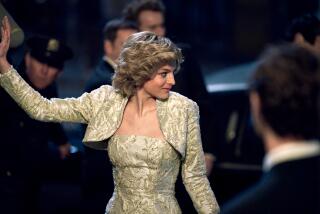The Travails of a Victorian House Husband : VICTORIA AND ALBERT: Their Love and Their Tragedies by Richard Hough; St. Martin’s Press : $23.95, 240 pages
- Share via
Public abuse of the crowned heads of England is nothing new, as we discover in “Victoria and Albert,” by Richard Hough. Long before Charles and Di, Andrew and Fergie, or even Edward and Mrs. Simpson, the British monarchy was already afflicted with petty scandal and bad press.
“The Court is plunged in shame and mortification,” thundered one 19th century courtier over a nasty little squabble that became an affair of state because it took place in the royal household. “The palace is full of bickerings and heart-burnings.”
Hough, a veteran biographer of famous Britons with some 30 books of popular history to his credit, is no heavy-breathing gossip monger, but he manages to enliven his account of the royal marriage of Victoria and Albert with what passed for the dirty little secrets of the British monarchy in an era before toe-sucking and topless sunbathing were making headlines.
Victoria, the woman who gave her name to an era, was born into the cash-strapped and crisis-ridden royal family in 1819. Nothing in her early years hinted at the prominence that she would achieve--her parents, then living in Germany, were forced to borrow money to make the trip to Kensington Palace so that she could be born on English soil, and her childhood was privileged but hardly exalted.
“I used to ride a donkey given me by my uncle, the duke of York,” Victoria wrote of her early years. “I had a great horror of bishops on account of their wigs and aprons.”
By the time of her coronation, the 18-year-old Victoria was already a domineering, if rather isolated, figure who fully appreciated the prerogatives of her position. “No monarch had come to the English throne with more excitement and zest for the task,” writes Hough. “She adored the exercise of power unrestrained by consideration for anyone else if she so wished.”
Victoria was no less commanding when it came to her courtship of the man who would become her husband and consort, a German cousin. As royal protocol required, it was Victoria who proposed marriage to Albert, but the lonely woman who wore the crown was quite earnest: “I told him I was quite unworthy of him,” she recalled, “and kissed his dear hand.”
As it turned out, Albert was much loved but not much honored by his wife. At their nuptials, Victoria insisted on reciting the solemn vow to “love, honor and obey,” but the queen proceeded to exclude her consort from affairs of state throughout their marriage, even though--as Hough argues--he often displayed a superior insight into English politics.
“Sometimes, almost as if it was a child’s treat,” Hough writes, “Albert was allowed to hold the blotting paper and blot Victoria’s signature as she worked her way through a pile of documents and letters.”
Albert is the real focus of Hough’s book, which chronicles the disappointments and frustrations that come with marriage to a monarch. Although Victoria indulged Albert by speaking German in the household quarters, he never succeeded in his ambition to forge an alliance between the country of his birth and the country whose queen he wed. Indeed, Albert was lampooned as a gold-digging foreigner in the popular prints: “He comes to take ‘for better or worse,’ ” went one ditty, “England’s fat queen and England’s fatter purse.”
While Victoria reigned over the British Empire at the very height of its power and glory, Albert was forced to content himself with horse breeding, patronage of science and industry, and other good works. For example, he devoted much attention to improving the sanitation at Windsor Castle, where “drains were blocked, cesspools unemptied,” and the royal kitchen “running with mice, rats and cockroaches,” all of which were far more objectionable to the German prince than to the British monarch or her subjects.
But none of these approved enterprises quite satisfied the queen’s consort. Even Albert’s sponsorship of the design and construction of the Crystal Palace, the site of the Great Exhibition of 1851 and one of the enduring emblems of British primacy in the 19th century, turned out to be a bitter disappointment when the event was over and the glorious structure was dismantled and carted away to a new location outside of London.
“Something was lost to him, some spark of inspiration was drained away,” Hough writes. “Both his nerves and his physical condition deteriorated and were never completed regained.”
Albert was a notorious hypochondriac, but his final ailment--typhoid fever--turned out to be very real indeed, and he died at 42 in 1861. “I must try and live on for a while yet,” wrote his grief-stricken widow, who went on to reign for 40 more years in the new guise of “the widow of Windsor,” as Kipling dubbed her.
As we learn in Hough’s absorbing and rewarding book, the marriage of Victoria and Albert lacked both the high drama and the base scandal that we have come to expect from British royalty. But Hough manages to capture and convey the essential intimacy that Albert provided to the celebrated British monarch. Her cry of grief at his death allows us to glimpse exactly what she lost when he left her: “There is no one to call me Victoria.”
More to Read
Sign up for our Book Club newsletter
Get the latest news, events and more from the Los Angeles Times Book Club, and help us get L.A. reading and talking.
You may occasionally receive promotional content from the Los Angeles Times.










